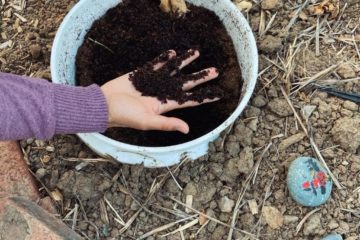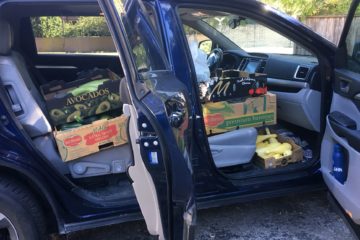Written by Isabel Realyvasquez, Grant Writing & Development Intern
Ripe red vine-tomatoes and wavy-leaved heads of lettuce, sprouting from the soil after weeks of dedicated hard work and attention, demonstrate the most apparent benefit of a garden: fresh produce! But even the act of gardening is immensely beneficial for the mind, body, and soul. Gardening can help raise your spirits and confidence, encourage self-care, boost self-esteem, and inspire paths for self-growth and self-determination. At the same time, gardening can remind you of the benevolent role humans can play in their environment and community. This article will consider how stepping outside, getting your hands dirty, and connecting your soul to the soil can positively impact your day-to-day life and empower your future.
Sowing Seeds of Self-Care
Almost all plants you find in a garden thrive on a balance of three key elements: soil, water, and sunlight. These are constants in a simple yet remarkable equation that makes the world go round; they allow seeds to mature and reach their full potential as fruiting or pollinator plants. Seeing this process unfold in a garden can be a powerful reminder of the necessities humans also require to live: food, water, clean air, and sunlight. Taking care of a plant or a garden — a reflection pool of your own life — can remind you of the essentials amidst the complexities of everyday life. And, like a plant, you too can reach your dreams and full potential when you remember to slow down, reset, and take in the compassion, care, and kindness you need to keep growing. May each new bud, sprout, shoot, fruit, or flower that appears in your garden be a symbol of achievement for all that you too can replicate if you nurture your soul and take one day at a time!
Spending time in a garden is a wonderful way to tend and upkeep your self-care because it can improve your physical and mental health as well. Many people are turning to gardens for “green” therapy, finding that it aids well-being, mental health, and recovery (Johnson, 2019). One benefactor of therapeutic gardening considers a garden space a refuge where, for a little while, “the outside world stays outside,” allowing them time to focus on their mental health needs (Johnson, 2019). When you pause to enjoy the place of plants, you might find that you return to the hustle and bustle of daily life with new perspectives that can help to alleviate past stresses and worries. Furthermore, while some people appreciate the solace gardening on your own affords, social gardening can also be an uplifting experience. As a study from Clinical Medicine suggests, communal gardening can counteract social isolation through social interaction (Thompson, 2018). It can also strengthen community bonds and resiliency against food insecurity (Lovell et al., 2014). Whether you need perspective after a long day or a busy work week or want to join a group like Each Green Corner to find others seeking connection with their environment and community, a garden can offer you such support.
Nurturing Self-Esteem
Gardening can be a fulfilling activity. When your garden’s strawberry plant proves it has taken root with a white blossom or your orange tree lowers its branches for you to pick hard-earned fruits of labor, gardening can give you a boost to your self-esteem. There is a humble reward in being able to admire the plants you helped to propagate and saying, “I helped do that!” Gardening can give you a sense of accomplishment and pride, reminding you of the positive and valuable contributions you bring to your loved ones and local community.
“Victory gardens” are a self-esteem-boosting pastime that many people have revived amid the COVID-19 pandemic. Gaining popularity in World War II when food sources were scarce, victory gardens — small or large plots of dirt in which people grow their own food — helped people become self-sufficient and aid their neighbors and communities during a global crisis. While the pandemic continues to impose feelings of anxiety, stress, and powerlessness upon millions of Americans, historian Anastasia Day remarks that “gardening is a really concrete way that people can feel empowered — at least within their own lives” (Onion, 2020). Indeed, in times of personal and social crisis, a garden is an outlet where you can recharge your self-esteem and reclaim a sense of restored balance and purpose in your life (Chalmin-Pui et al., 2021).
Gardening can also be a productive, morale-boosting service with which you can help others. Like the mission of victory gardens, EGC aims to empower communities to increase food sovereignty. We do this by training and assisting communities in building sustainable food-producing gardens at schools, community centers, and at-risk residential areas to produce culturally-diverse produce for donation to nonprofit food distribution partners and communities. Food insecurity deeply afflicts many communities and is detrimental to self-esteem. A study from BMC Public Health shares that “food insecurity is highly associated with anxiety and depression,” and finds “the relative risk of mental illness from being food insecure is almost three-fold that of losing a job during the pandemic (Fang, 2021). When you rally with others in your community to garden, you make a palpable difference in the lives of others. In this way, gardening is an empowering activity that enhances your sense of self-worth while alleviating hardships caused by food insecurity.
Cultivating Self-Determination
Gardening for food sovereignty is one way of securing self-determination via self-sufficiency. Yet gardening to understand who you are and who you want to be can also help you on your journey towards self-determination. TikTok influencer Marcus Bridgewater considers the lessons of self-determination you learn when caring for plants: “it can be difficult to re-root, establish new relationships, grow beyond the old form, but it can also be what’s needed to create new and healthier roots in our future” (Issawi, 2020). When you become a steward of a plot of land, communal garden bed, or pot in your backyard, you may discover, or perhaps rediscover, your own roots in the earth. For food writer Stephen Satterfield, gardening provides this reflective experience. While many communities of people of color have suffered a fraught relationship with agricultural land due to slavery and its intergenerational trauma, Satterfield discovered that gardening could allow people of color to forge new relationships with the soil. “The garden,” Satterfield says, “was a stage for me to indulge in my ancestral relationship to the land but also to obliterate it. My time was mine. I came as I pleased, and I found peace in my thoughts tunneling into tiny bits of earth” (Satterfield, 2021). For BIPOC communities, gardens can be liberating spaces, and gardening can be an empowering act of justice, allowing individuals to make decisions for themselves and the land for which they care. Indeed, activist and professor Monica White considers how, for African American women, gardening “offers an opportunity to work against systems and structures that have oppressed them” (White 2011). Gardens not only allow you the creative freedom and free rein to choose what foods you or your community will enjoy but encourage self-autonomy and confidence in your ability to provide for yourself and others.
We at Each Green Corner aim to empower those who can benefit from gardens and the fresh produce they provide and those who want to learn more about the benefits of gardening. EGC’s Living Campus, Residential Gardens, and Seedling Starters programs all strive to enhance food sovereignty, increase access to fresh fruits and vegetables, impart knowledge of sustainable urban agriculture to others, and give people the chance to learn about the empowering benefits of green spaces. Consider testing out your green thumb by volunteering with us and see how you can empower yourself and others!
Whether you want to garden with EGC for a peaceful session of self-care or reflection, a self-esteem boost, or to cultivate your identity and self-determination, we look forward to seeing you at one of our sites!
References
Chalmin-Pui, L. S., Griffiths, A., Roe, J., Heaton, T., & Cameron, R. (2021, May). Why garden? – Attitudes and the perceived health benefits of home gardening. Cities, 112, 103118. https://doi.org/10.1016/j.cities.2021.103118
Fang, D., Thomsen, M. R., & Nayga, R. M. (2021, March 29). The association between food insecurity and mental health during the COVID-19 pandemic. BMC Public Health, 21(1), 1–8. https://doi.org/10.1186/s12889-021-10631-0
Issawi, D. (2020, August 18). How Plants Can Help People Grow. The New York Times. Retrieved February 22, 2022, from https://www.nytimes.com/2020/08/18/style/self-care/self-care-plants-garden-marcus-tiktok.html
Johnson, S. (2019, May 13). Green therapy: How gardening is helping to fight depression. The Guardian. Retrieved February 22, 2022, from https://www.theguardian.com/society/2019/may/13/green-therapy-gardening-helping-fight-depression
Lovell, R., Husk, K., Bethel, A., & Garside, R. (2014). What are the health and well-being impacts of community gardening for adults and children: A mixed method systematic review protocol. Environmental Evidence, 3 (1), 20. https://doi.org/10.1186/2047-2382-3-20
Onion, R. (2020, April 11). “Victory Gardens” Are Back in Vogue. But What Are We Fighting This Time? Slate Magazine. Retrieved February 22, 2022, from https://slate.com/human-interest/2020/04/victory-garden-coronavirus-wwii-history.html
Satterfield, S. (2021, October 26). Reclaiming 40 Million Acres, One Garden at a Time. The New York Times. Retrieved February 22, 2022, from https://www.nytimes.com/2021/10/26/special-series/black-gardeners-pandemic.html
Thompson R. (2018, June). Gardening for health: a regular dose of gardening. Clinical Medicine, 18(3), 201–205. https://doi.org/10.7861/clinmedicine.18-3-201
White, M. M. (2011). Sisters of the Soil: Urban Gardening as Resistance in Detroit. Race/Ethnicity: Multidisciplinary Global Contexts, 5(1), 13–28. https://doi.org/10.2979/racethmulglocon.5.1.13



0 Comments